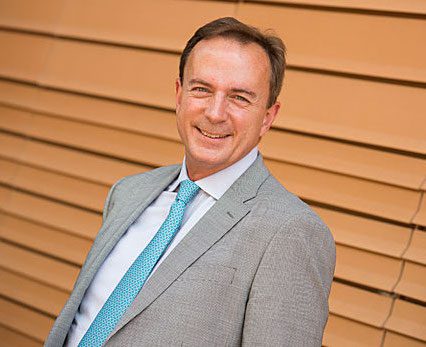
Recently, the internationalization of higher education has been deeply impacted by the twin forces of the COVID-19 pandemic and international politics. While resurgent nationalism and xenophobia around the world had already cast doubts on the importance of a globalized system of higher education, the pandemic has only added to the conundrum by imposing restrictions to the normal movement of people within and between the world’s universities.
Against the backdrop of this unprecedented scenario, the future of international higher education suddenly seems bleak. To contribute to this discussion, the Association of Indian Universities and the US Embassy in New Delhi collaborated with Harvard University to present a special lecture series entitled “The Future of Higher Education” on Friday, August 7.

Mark Elliott, Vice Provost of International Affairs at Harvard University. Photo by Stephanie Mitchell/Harvard Staff Photographer.
The webinar, moderated by Karl Adam, First Secretary of Education and Culture at the US Embassy of New Delhi, and Pankaj Mittal, Secretary General of the Association of Indian Universities, sought to answer a key question: What is the future of the internationalization of higher education in a post-pandemic world?
Professor Mark Elliott, Vice Provost for International Affairs at Harvard University, began the talk. “In the short term, it is clear that the pandemic has indeed affected massive changes in the patterns we have come to observe in international higher education,” he said.
Professor Elliot went on to discuss the future of internationalization of higher education. “The enormous experiment in online education will leave us all permanently changed. We would be far more willing to participate in long-distance educational ventures. The work we have been doing in this area for the last few years would be seen as preparatory to a more widespread turn to online teaching, and education, and knowledge transfer. Universities will become more involved in this domain than before,” he explained. According to Professor Elliott, a possible increase in the number of partnerships between universities could occur, and after COVID-19, more people in administrative positions will be able to see the value of cultivating relationships at an institutional level.
Speaking about the recently introduced National Educational Policy (NEP) 2020 in India, he noted its promise of a new beginning in education at all levels in India, laying the foundation for a brighter future for Indians from diverse backgrounds.
In the coming year, Professor Elliott notes that, though the number of international scholars will likely decline, there will be a rebound stage — with different trends. “Travel is almost impossible right now in many parts of the world, and it will continue to be that way for quite some time. It can be a while until there is a rebound in the total number of international students, but when that rebound comes, it’s quite possible that some of the trends that we have begun to adapt to will be permanent,” he said.
The essentiality of workshops and research collaborations has not gone unnoticed, and, according to Professor Elliott, will continue. “Even if people cannot travel, conferences which were cancelled are coming back in alternative forms or hybrid forms, smaller-scale symposia, and workshops. People have adapted to the changes, and we see it as a larger change on the horizon,” he concluded.
